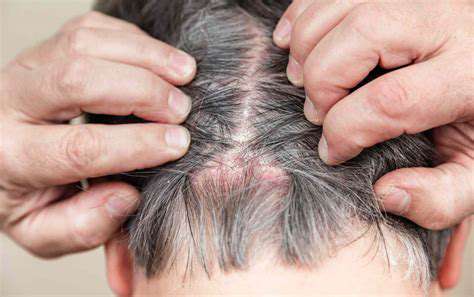Identifying the Root Causes of Scalp Pain for Optimal Treatment
Introduction
Understanding Scalp Pain: Common Symptoms
Scalp pain can manifest in various ways, with symptoms ranging from a dull ache to sharp, stabbing sensations. Many people report tenderness when touching the scalp, which can be disconcerting and limit daily activities. It's essential to recognize these symptoms early to address the underlying issues effectively.
Some may experience scalp pain in conjunction with other symptoms, such as headaches or neck discomfort. These additional symptoms can provide clues about the root cause of the pain. Keeping track of when these symptoms occur can help in identifying patterns that may be linked to specific triggers.
In some cases, scalp pain may be accompanied by visual signs, such as redness or swelling in the affected area. These physical manifestations could indicate an inflammatory process and may warrant a professional medical evaluation to determine the appropriate course of action.
Potential Causes of Scalp Pain
There are numerous factors that can lead to scalp pain, and it's crucial to consider each one. Tension headaches, often caused by stress or poor posture, can result in referred pain to the scalp. Identifying stressors and incorporating relaxation techniques can be beneficial in managing this type of pain.
Another common cause of scalp pain is scalp conditions such as psoriasis or seborrheic dermatitis. These conditions can lead to inflammation and sensitivity, resulting in discomfort. Treatment for these conditions often involves topical solutions that reduce inflammation and soothe the scalp.
Additionally, nerve issues, such as occipital neuralgia, can manifest as scalp pain. This occurs when the occipital nerves, which run from the top of the spinal cord to the scalp, become irritated. Treatment options may include medication, physical therapy, or nerve blocks to alleviate symptoms.
Effective Treatment Options for Scalp Pain
Addressing scalp pain involves a multifaceted approach tailored to the cause of the discomfort. Over-the-counter pain relievers such as ibuprofen or acetaminophen can help manage symptoms temporarily. However, they should be used judiciously and not as a long-term solution.
For those suffering from inflammation-related scalp pain, corticosteroid creams or shampoos may provide significant relief. These topical treatments can reduce redness and itching, ultimately improving comfort levels.
In cases where a more systemic approach is needed, consulting a healthcare professional is vital. They may recommend therapies such as physical therapy, stress management counseling, or even prescription medications, depending on the severity of the pain and its underlying cause.
Common Causes of Scalp Pain

Muscle Tension and Stress
Muscle tension in the neck and scalp area often leads to discomfort and pain. This tension can arise from poor posture, prolonged screen time, or stress. Recognizing and addressing these triggers is crucial for relief.
Stress and anxiety can also contribute to scalp pain by causing muscles to tighten involuntarily. Techniques such as relaxation exercises, yoga, or physical therapy may help alleviate this strain.
Skin Conditions and Infections
Certain skin conditions, such as psoriasis or dermatitis, can manifest as painful patches on the scalp. These conditions not only lead to discomfort but can also result in inflammation and itching. Seeking dermatological advice is vital for proper diagnosis and treatment.
Infections, such as folliculitis or shingles, can cause significant pain in the scalp area. This pain can be exacerbated by hair movement or touching, making it important to seek prompt medical intervention for effective management.
Effective Treatment Strategies

Understanding Scalp Pain
Scalp pain can manifest in various forms, ranging from mild discomfort to severe throbbing sensations. Identifying the root cause is crucial for effective treatment. It often arises from various underlying conditions, including tension headaches, infections, or psoriasis. Understanding the different types of pain can help guide appropriate self-care and medical interventions.
Some individuals may experience pain localized to certain areas of the scalp, while others might feel a general discomfort. This can be exacerbated by external factors such as stress or environmental irritants. Recognizing these triggers is essential for managing symptoms effectively.
Additionally, scalp pain may be accompanied by other symptoms, such as itching or burning sensations. These accompanying symptoms can provide valuable clues to the underlying issue. A comprehensive assessment will help determine the best approach to alleviate discomfort.
Overall, understanding scalp pain involves acknowledging both its physical manifestations and psychological components. By analyzing these factors, individuals can take more informed steps toward relief.
Common Causes of Scalp Pain
Several medical conditions can contribute to scalp pain. Migraines and tension-type headaches are among the most prevalent causes. Temporal arteritis and occipital neuralgia can lead to severe pain localized to specific regions of the scalp.
Infections such as scalp folliculitis or fungal infections like ringworm can also result in significant pain and discomfort. These infections often require targeted treatments to resolve fully. Understanding these various causes helps guide effective diagnosis and treatment strategies.
Other factors include physical trauma, such as a concussion or injuries from vigorous hair styling practices. Chronic conditions such as fibromyalgia can amplify scalp pain, indicating a need for multidisciplinary approaches in treatment. Identifying these causes accurately is vital for personalized care.
Lastly, dermatological issues like psoriasis or dermatitis can lead to inflamed and painful scalps. These conditions often require topical treatments to manage effectively. Addressing the underlying causes is essential for reaching the best outcomes in scalp pain relief.
Diagnosis and Evaluation Methods
Diagnosing the cause of scalp pain begins with a thorough medical history and physical examination. Healthcare providers often inquire about headache patterns, scalp sensitivity, and any accompanying symptoms. A detailed history can significantly narrow down potential causes.
Diagnostic tools such as imaging studies or blood tests may be utilized to rule out serious underlying conditions. For example, a CT scan can assess for structural issues, while blood tests can identify infections or inflammatory markers. The results of these tests inform the treatment plan.
Dermatological evaluations may also play a crucial role in the diagnostic process. Skin conditions directly impact scalp health, and treatment may begin with addressing these first. A biopsied skin sample can provide insight into chronic skin conditions that affect scalp pain.
Ultimately, a collaborative approach involving various specialists may be necessary to manage scalp pain effectively. Past treatment effectiveness can also guide future strategies, making personalized evaluations key in achieving optimal results.
Effective Treatment Options
The treatment for scalp pain varies based on its underlying cause. Over-the-counter pain relievers can offer immediate relief for headaches, while topical medications may help alleviate dermatological conditions. Understanding the specific cause is key to selecting the most effective treatment.
For infections, antifungal or antibacterial medications may be necessary to eliminate the underlying issue. Adjunct therapies, such as medicated shampoos or anti-inflammatory creams, can address associated scalp irritation and promote healing. A healthcare provider might also recommend lifestyle changes to minimize triggers.
Head pain management may involve stress-reduction techniques, physical therapy, or acupuncture for conditions like tension headaches. These holistic approaches can complement traditional treatments, enhancing overall well-being. Individualized care plans are essential for long-term relief.
In some cases, prescription medications or advanced therapies like nerve blocks may be warranted for chronic conditions. Continuous monitoring and adjustment of these treatments ensure optimal management of scalp pain over time. This proactive approach empowers individuals to regain control over their health.
Maintaining Scalp Health
Maintaining a healthy scalp is essential in preventing pain and discomfort. Regular washing and using appropriate hair care products can help prevent buildup that leads to irritation. Incorporating scalp massages and oil treatments can also enhance circulation and promote overall scalp health.
Paying attention to diet can support scalp health as well. Nutrient-rich foods provide the necessary vitamins and minerals that contribute to healthy skin and hair. Hydration plays a vital role in maintaining scalp moisture and reducing dryness.
Managing stress through relaxation techniques and physical activity also positively affects scalp health. Excessive stress can exacerbate pain and discomfort, making it crucial to incorporate stress management strategies into daily routines. Regular exercise and mindfulness practices can foster a sense of overall well-being.
Lastly, routine check-ins with healthcare providers can ensure any emerging scalp issues are addressed promptly. Early intervention is key to preventing conditions from worsening. By prioritizing scalp health, individuals can enjoy a pain-free and vibrant scalp.